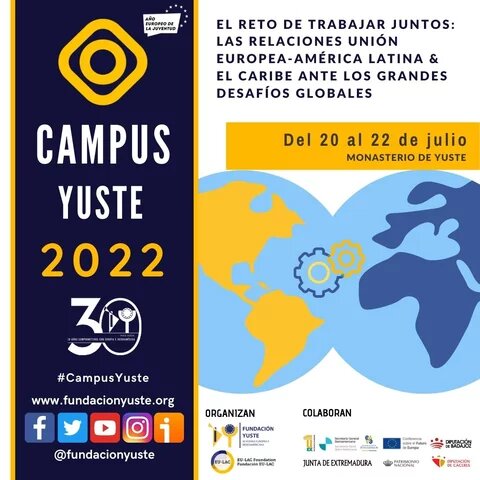We would like to inform you that the registration and application period is now open for 260 grants to finance tuition fees, accommodation and living expenses for the Campus Yuste international courses. Check more information here!
The European and Ibero-American Academy of Yuste Foundation and the EU-LAC Foundation are organising, in collaboration with the University of Extremadura, the Ibero-American General Secretariat (SEGIB) and the Euroamerica Foundation, the course 'The Challenge of Working Together: European Union-Latin American and Caribbean Relations in the Face of the Great Global Challenges', which will take place between 20 and 22 July 2022..
The course aims to continue the Foundation's line of work in development education by addressing specific topics within the framework of EU-Latin America and the Caribbean relations and the 2030 Agenda.
The aim of this course is to address the challenges faced globally in EU-Latin America and the Caribbean relations, contributing through training, reflection, debate and knowledge transfer to further study and improve the implementation of strategies that contribute to the construction of peaceful, supportive and egalitarian societies, thus contributing to the Sustainable Development Goals (SDGs).
The course will analyse the current situation of relations between the European Union, Latin America and the Caribbean from the perspective of multilateralism. It will also seek to answer the question of how to work together to address common challenges, including: social cohesion, sustainability and the fight against climate change, digitalisation, multilateral institutions and other strategic issues linked to global trends.
The course will also address the emergence of new urgencies in both Europe and Latin America and the Caribbean as a consequence of COVID-19: international financing taking into account the situation of financial markets and fiscal policies in Latin America and the Caribbean; the need to strengthen democracy and the rule of law, and thus strengthen states, their institutions and public services; regional integration; ecological and digital disruptions; internal pacts in Latin America and the Caribbean for social dialogue; and the valorisation of state pacts.
